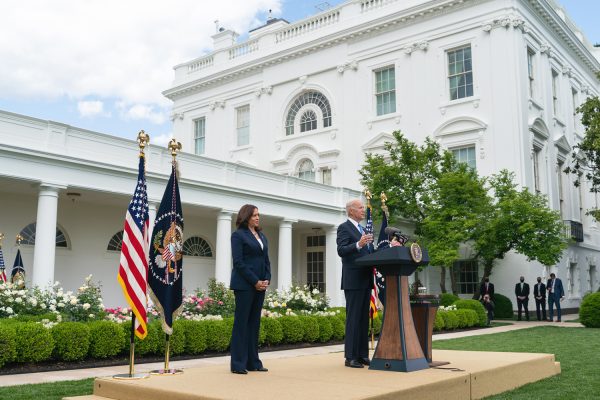
During last year’s presidential election, Joe Biden promised to end America’s “artificial trade war” with Europe. His predecessor, Donald Trump, had imposed $7.5 billion worth of tariffs on European aluminum and steel.
Biden has relaxed the tariffs, but not abolished them. The EU has completely pulled down its retaliatory tariffs on bourbon whisky and Harley-Davidson motorcycles.
If anyone deserves credit for ending the trade war, it’s the EU.
Reminder: tariffs are terrible
Tariffs raise prices for consumers and make industries less competitive. Shielded from competition, companies have less incentive to cut costs or raise the quality of their output.
The European Commission wisely chose to tax products not made in Europe. Bourbon comes from Kentucky, the home state of the Republican leader in the Senate, Mitch McConnell. Harley-Davidson is headquartered in Wisconsin, the home state of the then-Republican speaker of the House of Representatives, Paul Ryan. The tariffs made bourbon and Harley-Davidsons more expensive for Europeans, but at least they didn’t hurt European industries.
Tariffs may protect jobs in one industry, but they tend to cause job losses in others. Eighty times more Americans work in sectors that are dependent on steel rather than produce steel. When tariffs raise the price of steel, new cars become more expensive, so Americans buy fewer cars, so General Motors and Ford need fewer workers.
The same applies to aviation, a major buyer of aluminum.
The same applies to construction. The high price of steel makes it more expensive to build and repair bridges and railways, which helps explain why about 46,000 bridges in America, or 7.5 percent of the total, are structurally deficient and why California High-Speed Rail is so many years over schedule and tens of billions of dollars over budget.
Convoluted system
Trump put a 10 percent tariff on aluminum and a 25 percent tariff on steel.
Biden has agreed to eliminate the tariffs, but only on a fixed volume of imports.
In 2022, the tariff-free quota for primary aluminum would be 18,000 metric tons, for semi-finished aluminum 366,000 metric tons, and for steel 3.3 million metric tons.
The year before Trump introduced tariffs, European countries sold 5 million tons of steel to America.
There’s not just one quota for aluminum and one quota for steel. Rather, Biden brings in seventy separate quotas for each of the 27 countries of the EU.
The tariff-free quotas would be adjusted yearly to match American demand: for every 6 percent increase in demand, the quotas would go up 3 percent. So with every year, Europeans could export less and less metal tariff-free.
Victory for whom?
If that weren’t complicated enough, individual businesses can apply for exemptions.
Trump granted dozens of exemptions to companies which often happened to be owned by Republican donors. They are extended for two years.
The White House calls the deal a victory for consumers, claiming — incredibly — that it will lower prices.
It looks more like a victory for established firms and the well-connected.
